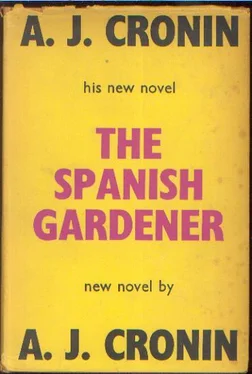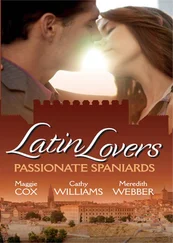Archibald Cronin - The Spanish gardener
Здесь есть возможность читать онлайн «Archibald Cronin - The Spanish gardener» весь текст электронной книги совершенно бесплатно (целиком полную версию без сокращений). В некоторых случаях можно слушать аудио, скачать через торрент в формате fb2 и присутствует краткое содержание. Жанр: Классическая проза, на английском языке. Описание произведения, (предисловие) а так же отзывы посетителей доступны на портале библиотеки ЛибКат.
- Название:The Spanish gardener
- Автор:
- Жанр:
- Год:неизвестен
- ISBN:нет данных
- Рейтинг книги:4 / 5. Голосов: 1
-
Избранное:Добавить в избранное
- Отзывы:
-
Ваша оценка:
- 80
- 1
- 2
- 3
- 4
- 5
The Spanish gardener: краткое содержание, описание и аннотация
Предлагаем к чтению аннотацию, описание, краткое содержание или предисловие (зависит от того, что написал сам автор книги «The Spanish gardener»). Если вы не нашли необходимую информацию о книге — напишите в комментариях, мы постараемся отыскать её.
The Spanish gardener — читать онлайн бесплатно полную книгу (весь текст) целиком
Ниже представлен текст книги, разбитый по страницам. Система сохранения места последней прочитанной страницы, позволяет с удобством читать онлайн бесплатно книгу «The Spanish gardener», без необходимости каждый раз заново искать на чём Вы остановились. Поставьте закладку, и сможете в любой момент перейти на страницу, на которой закончили чтение.
Интервал:
Закладка:
"There are two players on each side, the delantaro —that's the forward—and the zaguero , the back. Huesca plays in blue shirts, San Jorge in white. The pelota —that's the ball—is made of India rubber, bound with yarn and covered with sheepskin, and they throw it with the cesta . The play is fast, oh, terribly fast… ."
At this point, in sudden interruption, there came a concerted shout from the crowd and, vaulting over the barrier on the opposite side of the concrete rectangle, the four players appeared upon the court. They wore singlets and white linen trousers; and fastened to the right hand of each, by means of a glove attachment, was a kind of light wickerwork basket. As they began a swift practice knock-up against the walls the Consul felt Nicholas grow tense beside him.
"Now you see. Father. You see why we came. Isn't it a surprise for you? Isn't it splendid?"
At first Brande did not understand, but, following the child's glowing gaze, he saw that it was fixed magnetically upon the younger of the two San Jorge players, a tall lithe figure, moving with graceful ease about the court. It was José.
The Consul started, lost countenance, and for a long moment remained quite motionless. In a flash of understanding the situation became clear to him—the boy's eagerness to come to the match, his extraordinary knowledge of the game, his undreamed-of, yet unmistakable complicity with the young gardener.
"Look, look. Father," Nicholas shrilled. "They're starting now. And José's seen us. He just waved his hand to me."
Out on the court the forward of the Huesca side had taken his position at the mark; and amidst a sudden stillness he bounced the pelota once, then shot it hard against the wall. Dully, Harrington Brande followed the flight of the ball, as with incredible speed it flew back and forwards. He was conscious of a hurt, tight feeling in his chest, which hindered his breathing, and increased his existing sense of oppression. Had they not been wedged irremovably by the mob he would have risen and led his son from this odious enclosure. Instead, although aware that he would thus intensify his hurt, the Consul glanced sideways at the boy, who, poised upon the edge of the bench, quite unmindful of any discomfort, was thrillingly absorbed in the progress of the contest. With bright eye and parted lips, his small fists clenching and unclenching, he swayed and stiffened in unison with the others, muttering intent exclamations of approval or dismay, and even, from time to time, joining his high treble shamelessly to the swelling vociferations of the crowd.
" Ole. Ole . Come on, San Jorge. Played … oh, well played, José amigo !"
With an effort Harrington Brande withdrew his gaze and returned it to the court. Warmed to the game, the players were now fiercely engaged in a series of long rallies, flashing the pelota against the wall from every angle of concha . It was incredible, the skill with which they caught the ball, not holding it even for an instant in the basket, before they sped it back, fast and true, like a bullet, to the mark. The sides, Brande could see, were evenly matched indeed, and the figures on the score board at this moment showed a tally of 19 all.
Both the Huesca men were young and agile. The San Jorge back, on the other hand, was middle-aged, a short and swarthy fellow with a cropped head and bandy legs, who played with great astuteness and experience, yet whose lack of speed prevented him from covering his proper section of the court. It fell, therefore, to his partner to offset this handicap and, as the Consul watched, in gloomy averseness, José's flowing action, the instinctive sureness of his touch, he could not but acknowledge that the youth surpassed by far the other players on the court. And with this came a sudden desire that San Jorge should be defeated in the match.
With an expressionless face—his chill official manner—Harrington Brande began to follow closely every stroke, every point of the game. The score was now 35 to 32 in favour of the Huesca pair who, with commendable strategy, were concentrating volley after volley upon the San Jorge back. Under this relentless attack and the weight of his years the older player was perceptibly tiring, and Brande smiled grimly within himself as the local supporters began to shout, swear, and shower execrations upon his grizzled head.
"Ole … Ole … Use thyself, Jaime! Run, old son of a dog. Come, José amigo , for the love of God save us from disgrace."
Under these exhortations it seemed that José was everywhere on the court, gliding, stretching, striking, always with that faint, gentle smile, even though his breath came quickly and the perspiration ran from every pore. But despite his efforts the Huesca men clung desperately to their lead and the score rose steadily, ominously, until it stood at 48 to 46.
The crowd was now in constant uproar, yelling, gesticulating, beseeching and reviling with Latin intensity. And little Nicholas, pale with excitement, was shouting his heart out with the rest.
"Come on, San Jorge. Come on, José. We want you to win … to win … to win."
At this, the Huesca forward played a deceptive drop shot and Jaime, completely winded, failed with the return. He threw up his hands to indicate despair and a groan broke from the San Jorge supporters. One more point would give Huesca the match.
Forwards and backwards went the pelota in what might well be the final rally. Suddenly the Huesca leader, leaping, slipped on the concrete and missed the ball. He rose at once, unhurt, with a confident wave to his followers. But no sooner had he restarted the play than José aced him with a cannon-ball return. An anxious cheer went up from the crowd. The score was now 49 to 48.
In a queer silence José went to the mark to serve. A profound stillness lay over the packed arena as the rally began. It was unendurably protracted, in a mounting anguish of excitement and suspense. The Huesca men were playing safely, depending upon their opponents to make a fault, while José, upon whom the burden of responsibility had fallen, seemed equally resolved to take no risks. Steadily, steadily went the exchanges, till suddenly, breaking that measured rhythm, José's long arm unexpectedly lashed out and with a change of pace, he angled the ball between his two opponents. The score was level at 49 all.
Now, no one dared to take a breath. They were all standing up, craning forward, watching the flying ball as it ricochetted between the walls. Huesca, with the courage of desperation, had thrown caution to the winds in a brilliant volleying action. Once, twice, they made shots which seemed certain aces but José, as though inspired, succeeded somehow in making a safe return. Finally there came a wide swift volley that looked well beyond his reach. He leaped high, high into the air, swung with all his strength, and crashed the ball home for the winning point.
A long low sigh ascended to the sky. Then pandemonium broke loose. Men threw their hats in the air, wept, laughed, embraced each other, and shouted in a kind of delirious ecstasy.
Nicholas, standing up bright-eyed, on the bench, kept swinging his arms, and crying wildly:
"Hurrah! Hurrah! I knew he'd do it! I knew! I knew! Hurrah!"
As the players, limp and exhausted, walked off the court, the crowd scaled the barrier and swarmed upon them. In an instant José was surrounded, hugged, kissed, and pounded; then, as he cried out for mercy, hoisted shoulder-high and borne from the enclosure.
"Oh, Father," Nicholas gasped, getting down at last. "Wasn't that wonderful? I'm so glad you took me."
The Consul answered with a rigid smile. The climax of the game, and the succeeding demonstration, had caused him the deepest mortification. Yet not for the world would he have revealed the strange, inexplicable bitterness which rankled within his breast. He took his son's hand and, as the crowd had now thinned, proceeded in silence toward the Plaza.
Читать дальшеИнтервал:
Закладка:
Похожие книги на «The Spanish gardener»
Представляем Вашему вниманию похожие книги на «The Spanish gardener» списком для выбора. Мы отобрали схожую по названию и смыслу литературу в надежде предоставить читателям больше вариантов отыскать новые, интересные, ещё непрочитанные произведения.
Обсуждение, отзывы о книге «The Spanish gardener» и просто собственные мнения читателей. Оставьте ваши комментарии, напишите, что Вы думаете о произведении, его смысле или главных героях. Укажите что конкретно понравилось, а что нет, и почему Вы так считаете.












